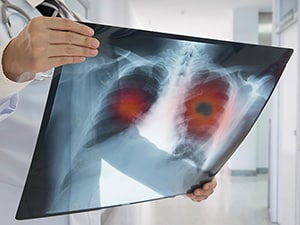Full Approval and New Combination for Amivantamab-vmjw
The FDA has approved amivantamab-vmjw, both alone and in combination with chemotherapy, for the treatment of certain non-small cell lung cancers.
The U.S. Food and Drug Administration (FDA) has approved amivantamab-vmjw (Rybrevant), in combination with carboplatin and pemetrexed, for the first-line treatment of patients with locally advanced or metastatic non-small cell lung cancer (NSCLC) that harbors an EGFR exon 20 insertion mutation.
Amivantamab-vmjw was previously granted an accelerated approval for use as a monotherapy in this patient population. The current decision also converted this accelerated approval to a full approval.

Amivantamab-vmjw is a bispecific antibody, a molecule that targets two different proteins—in this case EGFR and MET on the surface of NSCLC cells. Certain EGFR mutations—including an insertion in part of the gene called exon 20—can drive hyperactivity of EGFR, which can stimulate cancer growth.
Cells can sometimes develop resistance to EGFR-targeted therapy by upregulating MET. Amivantamab-vmjw blocks MET to delay or prevent drug resistance.
This decision was based on results from the randomized, open-label, multicenter, phase III PAPILLON clinical trial that recruited 308 patients with advanced NSCLC harboring exon 20 insertions. Patients were randomly assigned (1:1) to receive amivantamab-vmjw plus the chemotherapeutics carboplatin and pemetrexed or carboplatin and pemetrexed alone.
The median progression-free survival was 11.4 months for patients in the amivantamab-vmjw arm and 6.7 months for patients in the chemotherapy-only arm; this equated to a 60% decrease in the risk of progression or death with amivantamab-vmjw plus chemotherapy compared with chemotherapy alone. Overall survival was immature at the time of analysis.
Amivantamab-vmjw is given as an intravenous infusion. The recommended doses and infusion times are based on body weight.
NSCLC is the most common form of lung cancer, accounting for over 80% of lung cancer cases. The incidence of EGFR mutations in NSCLC varies widely based on race, with patients of Asian descent having the highest incidence and patients of European descent having the lowest incidence; anywhere from 1% to 12% of EGFR mutations in NSCLC are exon 20 insertions. According to federal statistics, it was estimated that 238,340 individuals would be diagnosed with lung cancer and 127,070 patients would die of the disease in the United States in 2023.
The FDA rendered its decision on March 1, 2024.
